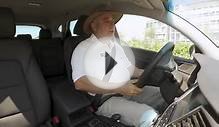
 Driving skills exam
Driving skills exam
The road test for a drivers license, unlike the written test must be scheduled ahead of time either by phone or sometimes online.
drive practice Tips:
Be familiar with the area you will be driving for the exam.
Several of my students choose to go to an office 30 minutes or more out of their way to take their drive exam because they have been told the route was easier there.
That is fine, but even if the route and examiners are easier at a distant office, remember that familiarity is half the battle of doing well when tested on your driving skills.
Being less familiar or unfamiliar with where you are tested will naturally increase your anxiety a bit and even if you don't seem more anxious, there could be a difficult, unexpected turn or intersection they take you through that could cause you to lose several points you wouldn't have lost if you knew the area.
If you choose a licensing office where you normally do not drive, get someone to take you out to that area as much as possible to practice driving so you will know what to expect on the roads where you will take the exam.
Know what specific skills you will be tested on and if possible, how the examiner will score those skills.
You can find this out several ways.
If you are taking a drivers education course with a professional drive instructor, your instructor will know what the drive examiners will be looking for and should let you know that information.
In some states, like Oregon, the back of the drivers license application has the score sheet the examiner will use, with the points that can be taken off for each error, as well as grounds for immediate failure.
check online. some states put put tips for their road test on their website.
The Drivers manual may tell you what will be on your road test.
Ask someone at your local drivers licensing office. they will tell you where to find road test tips for the driving skills test.
Friends or siblings who have already taken their drive test and passed it are good resources for road test tips on what to expect on the exam.
Have plenty of drive practice to the point you can perform the basic drive skills confidently and easily as it would be second nature to you.
If you go to your drive test with very little practice and still get nervous on turns and lane changes without being tested, you will be much more likely to commit driving errors while you are tested because you will naturally be more nervous being tested and with someone you don't know.
Even if you don't do mistakes that take off points themselves, if an examiner sees a lack of confidence, they could choose to not pass you just for lack of confidence while driving.
Practice as much as possible the SPECIFIC skills the examiner will test you on.
Other than turning, lane changing and basic car control which you will normally be practicing while driving, the examiner will be required to have you perform other specific driving maneuvers. In some states you must parallel park on your test, or back around a corner, in Oregon you must pull to the curb and back in a straight line.
Find out those maneuvers they will have you perform and find someone who can help you master them with practice.
This is a road test tip that might require a professional drive instructor even if it's only for one or two lessons.
When I was learning to drive, my dad attempted to teach me parallel parking, but he wasn't a professional instructor, so he really didn't know how to show me the way to use reference points. I got most of the points taken off my drive test when parallel parking.
INTERESTING VIDEO












